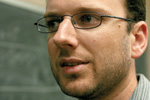From the editor: Anniversaries
 |
Physicists love to celebrate anniversaries, and this year is a particularly important one: the centennial of Albert Einsteins annus mirabilis, during which he published five papers that heralded a revolution for physics. Barely an area of physics survived in its previous form once the effects of Einsteins miraculous year had been appreciated and assimilated.
In recognition of the year that perhaps did more to change physics than any other, the United Nations has declared 2005 as the International Year of Physics. This follows the efforts of the European Physical Society, the International Union of Pure and Applied Physics, and UNESCO, which all declared 2005 the World Year of Physics. (The moniker WYP rather than IYP has been widely adopted because event preparations had to begin before the UN made its decision.) The declaration has been widely supported by physical societies, the US Congress and many other groups.
The World Year of Physics will not be celebrated only by physiciststhe global public will participate in this anniversary more than in any other physics event. Thousands of activities, big and small, are planned around the world, many originated by individuals outside academia or industry. One catalogue of events is at www.physics2005.org.
The international particle physics community is contributing to the WYP in many ways. One particular project worth following is Quantum Diaries, which chronicles a year in the life of young particle physicists. The participants are sharing their diaries publicly, supplemented with photo and video content to reveal what goes on behind the stereotypical face of research. In the future, historians might compare the 2005 Web diaries with personal letters written by scientists at the beginning of the 20th century, studying what changed, and what remained the same, about being a scientist.
As we celebrate 100 years of Einsteins groundbreaking work, the scientific community fully realizes the evolutionary nature of science. It is continually adapting to new data and observations with new species of theories, each tested for survival against further experimental evidence. It would take a bold person to predict that Einsteins work will one day become vestigial, but there are signs that Einstein did not have the final word. And so the World Year of Physics is not merely a commemoration, but signals a time for us to look back on how far we have come, in order that we can imagine how far we still have to go.
David Harris
Editor-in-Chief
Click here to download the pdf version of this article.


